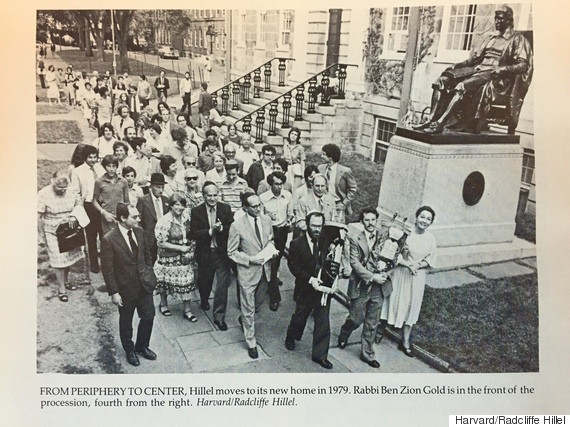
"In that day, declares the Eternal One of Legions, you will be inviting each other to the shade of vines and fig trees." (Zechariah 3:10)
For the community at Harvard, where I serve as a rabbi and chaplain, this is a time when thousands of students will be wending their ways from campus to family homes throughout the country and the world, for the winter academic recess.
In virtually all cases, looking several generations back, or even in present experience, the family home is not where it once was. Only a tiny fraction of Harvard students are of indigenous North American origin. From Mayflower bluebloods to children of present-day refugees, almost everyone's family is originally from somewhere else. Students from overseas are somewhat more likely to be returning home to families that have resided where they presently are for as far back as anyone can trace - but even in the international student community, stories of migration and displacement abound.
In the midst of the holiday of Chanukah, which celebrates the rededication of the ancient Temple in Jerusalem, it is well to remember that the Torah is a book of immigrants and refugees.
"I am a stranger and a sojourner with you," says our father, Abraham, to the Hittites in Hebron. (Genesis 23:4)
Our reading from the Torah this week, in synagogues all around the world, finds Abraham's great grandson, Joseph in Egypt, far from Canaan and his family home; and there come Joseph's brothers - and, next week, his father, too - fleeing famine, seeking refuge.
As viceroy to Pharaoh, Joseph names his sons with his Egyptian wife for his refugee experience, their Hebrew names reflecting their father's international odyssey: "God has enabled me to forget all my hardship in my father's house," and "God has made me fruitful in the land of my affliction" (Genesis 41:51-52) - with reference, respectively, to Canaan, where Joseph was sold as a slave by his brothers to a wandering band of Midianite merchants, and Egypt, where Joseph initially, as a foreign laborer, suffered suspicions, indignities, and even imprisonment.
Generations after Joseph's father, Jacob, and his family, find shelter of sorts as outliers in Egypt, the Torah sets our people of Israel on the move anew, in the story of the exodus from Egypt back to the Promised Land, a journey that constitutes the bulk of the Five Books of Moses.
Poignantly, too, the Torah never quite takes us all the way home. Although its stories and laws are a grand preparation for "when you come into the land," the Torah ends just on the verge of that arrival. And year after year we repeat the cycle of readings and of wanderings - with Abraham from Ur to Haran to Canaan to Egypt and back again to Canaan, through at least seventeen different locations - with Joseph, and then with his father's household, into Egypt anew, and finally with Moses and the Children of Israel through a wilderness-wandering of many way-stations. And then we start all over again.
Famously, we are taught to love the stranger, as we were strangers in the land of Egypt, (Deuteronomy 10:19) - not to vex or oppress a foreigner (Exodus 22:21) - and to treat the stranger who sojourns with us on equal terms (Leviticus 19:34), all on account of our own experience.
Our relationships with other nations, for generations to come, are determined by how they treated us when we were on the run and on the march. "No Amonite or Moabite nor any of their descendants may enter into the congregation of the Eternal One, not even in the tenth generation. For they did not come to meet you with bread and water on your way when you came out of Egypt." (Deuteronomy 23:3-4)
The prophet Zechariah, whose words we read in tandem with our Torah portion on this Sabbath of Chanukah, envisions Israel's homecoming anew - after yet another displacement, following the Babylonian destruction of Jerusalem - as not just our own story: "In that day, many nations will attach themselves to the Eternal One and become God's people." This depends on hospitality.
The experience of stranger-hood and of welcome is one Zechariah witnesses even in the heavens, in God's own throne room, in the prophet's vision, as he is shown the High Priest of his time, Joshua, standing in filthy garments before the Angel of the Eternal One. At first, Joshua is given to understand that he does not belong - and the Hebrew title of the Accuser who stands there to tell him so is Satan.
But God's Angel rebukes that Satan, saying of the bedraggled refugee, Joshua the Priest, "Is this man not a smoldering stick saved from the fire?"
And then a glorious transformation, and a remarkable promise take place: "Put a clean turban on his head," commands the Angel, and it happens, and Joshua is clothed in fresh raiment, and there finally he stands, an angel among angels, as he is told, "If you keep My statutes and walk in My ways, then also you shall judge My house and keep My courtyards, and I will give you access among these ones who stand here" - all in the highest heavens. (Zechariah 3:1-7)
"I drew them with human cords, with leading strings of love" (Hosea 11:4) is a prophetic passage our ancient rabbinic sages match with the story of Joseph's fetching up in Egypt, and, in turn, they link that verse to the Song of Songs, "Draw me, we will run after you - the king has brought me into his chambers - let us rejoice and be glad in you." (Song of Songs 1:4)
The deep and pervading message seems to be that, where the embrace of divine love and the search for shelter in good faith are concerned, being ostracized as an alien is alien to God.
Pundits, presidential candidates, and others who believe it can be righteous to proclaim otherwise should take note.
